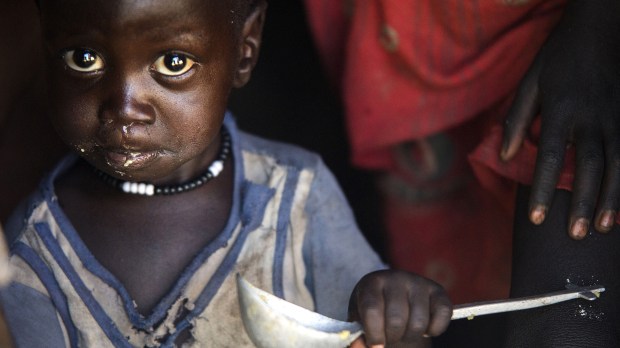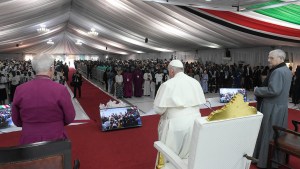More than 301,000 people have crossed the border from Sudan into South Sudan since conflict erupted in Sudan, and many of those people are showing up with signs of malnutrition.
Fighting broke out in April between the Sudanese Armed Forces and the Rapid Support Forces.
According to the Associated Press, at least one in five children arriving in South Sudan from Sudan are malnourished and more than 90% of arrivals haven’t eaten in days, the U.N. food agency said Tuesday.
The numbers keep growing, said Yembeh Marah, Catholic Relief Services’ South Sudan Head of Programming. But the bright spot amid the turmoil is the welcoming attitude of the South Sudanese.
“South Sudan is a resilient country,” Marah said in an interview Friday from Juba, where CRS is based. “And so what we have seen is the resilience of the South Sudanese to welcome people who are coming and to integrate in their communities. People have had open hands, even though resources are scarce.”
Marah pointed out that about 90% of the refugees are originally South Sudanese who had fled years ago to find better living conditions up north. But they have been away so long that very few have any family ties left in South Sudan, which won its independence in 2011.
“Families like that, who make those journeys, are often faced with having to travel for a couple of days, if not weeks, without having access to food or water,” he said. “And by the time they get to the crossing points, they have visible signs of acute malnutrition.”
Because they are escaping a situation of conflict, he said, “it’s not like it’s a journey for which they were prepared, that they woke up in the morning and said, ‘We want to take this journey.’ Nobody was prepared for all of this.”
Welcoming
South Sudan has its own humanitarian problems, and international aid makes up for only about a quarter of what’s needed.
“They are basically coming to a country that already has an existing humanitarian crisis, which is among the forgotten crises in the world,” Marah said. “In 2023, over 64% of the population of South Sudan was estimated to be in an emergency food crisis. So they already have food insecurity. And that’s over 9 million of the population, and that population includes over 4.9 million children.”
CRS, working through its partners in Sudan, does the best it can to help. Once refugees make it across the border, they are able to gain access to a humanitarian center, Marah said. “The South Sudan humanitarian community has done a significant job of ensuring that they are able to coordinate with the International Organization for Migration and the UNHCR … making sure that they are able to link people to have various assistance resources available.”
One of CRS’s partners is Caritas-Diocese of Malakal, which Marah said has been on the ground “from day one.”
Working with refugees who enter the country at the city of Renk, in the northeast, Caritas takes many up the White Nile River to get them closer to their destinations.
“They have a boat that’s so far supported in transporting over 2,000 people to their final destinations from Renk to Malakal.”
Marah described people coming in not only hungry, but also in need of shelter and immediate medical care. “They need access to basic water sanitation and hygiene facilities,” as well as psychosocial support to “help them overcome the trauma of their journey.”
Catholic Relief Services, which has been in South Sudan (formerly Southern Sudan prior to independence) since 1983, is there to help refugees settle and deal with longer-term issues.
“Most recently, we secured funding from the South Sudan Humanitarian Fund, and through that funding were able to target over 2,700 households, which is over 7,000 individuals, with about 25% of those being returnees affected by the Sudan crisis,” Marah said. “And we’re providing them with cash, which will help them to meet their immediate needs as a household.” Then CRS looks at “how we can be able to integrate them within the community and recover.”
Said Marah, “For us as Catholic Relief Services and other Caritas and international partners, we believe it is time for us to put our faith into action and come to the aid of vulnerable communities and families. And that way we will be able to preserve their human dignity and give them hope for a brighter future.”
Read about the work and donate here.



